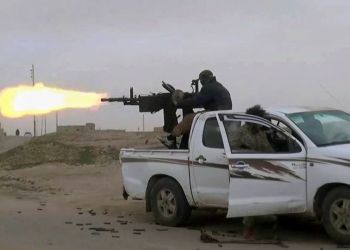This post is also available in:
![]() العربية
العربية
He always attended anti-Assad peaceful protests in Deir Ezzor and was always keen on their continuation. He had done so much things for the protestors, which some could not offer in the beginning of the Syrian revolution. He hosted the protestors in a time the Assad-regime was setting fire to houses owned by dissidents. The rebels would gather at his house and plan, arrange and coordinate with each other.
Mahmoud Youssef Hussein, was also known as Haj Mahmoud, was born in the city of Muhassan in the eastern countryside of Deir Ezzor. He grew up in the Old Airport neighborhood in the city, where Othman Ibno Afan mosque, from which the first calls for freedom and justice began, is also located.
In spite of his old age, 45, he partook in the peaceful protests since the moment they started, as he shared a common cause with all other civilians from Deir Ezzor; they all suffered atrocities and injustice under the oppressive rule of the Assad-regime.
Haj Mahmoud was among the first protestors in Deir Ezzor as he believed that they were an effective method to overthrow the regime. For him, protests reflected the conscious of the people through the slogans they would shout during their gatherings. As the protests increased in Deir Ezzor, it became necessary upon them to coordinate with each other in different areas in Deir Ezzor. Haj Mahmoud served as a link between all the people in his region, as he was loved and trusted by all of them.
He kept his door open to all protestors despite the fact that the regime was cracking down on any person that showed any kind of dissidence at the time. His house was turned into a headquarter where the protestors coordinated with each other; there was a room inside the house which was used to create anti-Assad banners. This took place in a time when everyone was wanted by the regime security forces, including Hajj Mahmoud.
He did not seek to lead the protests, his main concern was to coordinate with other neighborhoods and areas in Deir Ezzor to unify the revolutionary activities and keep the protests ongoing. When the Assad forces were deployed to the city of Deir Ezzor in the mid of 2011, Mahmoud was the first to pay a heavy price, as his house was raided, destroyed and ransacked.
In the meantime, Hajj Mahmoud had already left the city of Muhassan where he carried on his activities in cooperation with a group of protesters. He rejected anything related to armed uprising in the city of Muhassan at the time, as many civilians had been displaced to it after the regime stormed the city of Deir Ezzor. Protests were enough for him.
With the increase in the pace of events in Deir Ezzor, the regime resorted to weaponry to suppress the protests. The protestors continued their activities, however, this time they did so under the protection of the rebels. Hajj Mahmoud formed a small group to protect the them in an attempt to keep their revolutionary activities alive. When the regime started to murder in cold blood any protestor they found on the streets, the group led by Hajj Mahmoud began to set up ambushes against regime security patrols. They would raid the check posts in the city of Muhassan at night to paralyze Assad forces stationed at them so that they would not crack down on the protests.
They carried out several significant military operations against Assad forces, most notable:
Ghassan Aboud roundabout operation:
Following the martyrdom of Khalid Al Batash, a protester who had been murdered by the regime forces, Hajj Mahmoud appeared along with his comrades in the Old Airport neighborhood to protect the attendees during the funeral procession for the martyr, as the funeral ended, Hajj conducted a raid on the check post in Ghassan Aboud roundabout, killing a number of soldiers.
Al Farouq mosque operation: It took place when a group of regime security forces attempted to crack down on a protest.
The Municipal Stadium operation: As usual, a group of regime forces were harassing protestors in the city of Deir Ezzor then they were encircled and attacked by a group of rebels led by Hajj Mahmoud. Clashes continued for several hours before the regime forces had to withdraw.
The most significant military operation Hajj Mahmoud took part in was the storming of Al Mariyah checkpoint situated on the highway Deir Ezzor/ Al Bukamal in which the rebels managed to kill a first lieutenant and secured the defection of two regime elements stationed at the checkpoint, in addition to the capture of a number amount of weaponry and ammo.
He moved, along with his group, to the city of Muhassan to unify the military activities with other revolutionary groups in others villages, giving each of them their own duties. In the meantime, the regime tried to storm the city which was met by an outstanding resistance from the FSA who could inflict massive losses on the attacking forces. It was the official appearance of the FSA in the city Muhassan at the time.
After that, he returned to city of Deir Ezzor, where he established a headquarter in the Al Sinaa neighborhood from which they carried out several successful operations against the Assad forces.
He spent an entire year defending the principles of the revolution on both the military and peaceful level. In March 2012, Hajj Mahmoud fell martyr and thus the career of a beloved man was brought to an end. He was martyred during the battle of Al Russafa neighborhood in Deir Ezzor city, which was a turning point in the revolution. After he was encircled along with some of his comrades in the neighborhood, he tried to save them by attacking the Assad forces; however, a tank shell was fired at him and killed him. The regime handed over his dead body to his family after three days. His funeral was held in Muhasan city and was buried in Al Shuhadaa cemetery.










